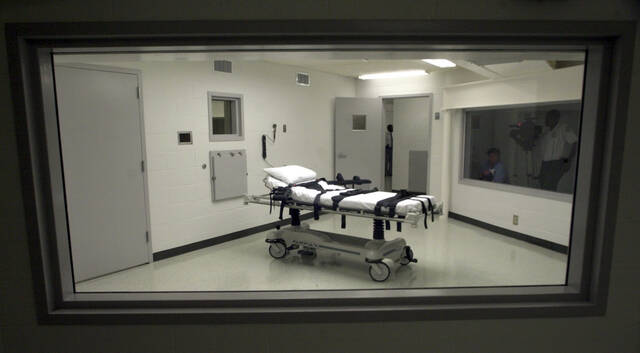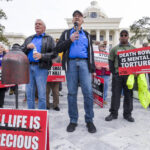MONTGOMERY — An Alabama inmate scheduled to be the first person in the United States to be put to death with nitrogen gas is waiting to see if he will receive a last-minute reprieve from federal courts in his bid to halt the execution.
Unless blocked by the courts, Alabama intends to execute Kenneth Eugene Smith, 58, by the never-used method of nitrogen hypoxia Thursday.
The U.S. Supreme Court denied Smith’s request for a stay Wednesday, rejecting his argument that it would be unconstitutional for the state to attempt a second execution after a failed lethal injection in 2022. The decision settles the first of Smith’s two legal efforts to halt his execution.
Smith also has asked the 11th U.S. Circuit Court of Appeals to block the execution from going forward but the court had not ruled as of Wednesday afternoon. The 11th Circuit is weighing Smith’s appeal of a federal judge’s Jan. 10 decision to let the execution go forward. Whatever the court decides, it is expected to be appealed to the U.S. Supreme Court.
Smith’s lawyers argued that the state is trying to make him the test subject for an experimental execution method. They argued the state’s plan, which uses a gas mask, puts him at risk for choking on his own vomit or a prolonged and painful death.
Some states are looking for new ways to execute inmates because the drugs used in lethal injections, the most common execution method in the United States, are increasingly difficult to find. If Smith’s execution by nitrogen hypoxia is carried out, it will be the first new execution method used in the United States since lethal injection was first used in 1982.
On Tuesday, the 11th Circuit asked a federal judge to review new information submitted by Smith that he was consistently vomiting ahead of the execution, heightening the risk of complications. U.S. District Judge R. Austin Huffaker Jr. ruled Wednesday that the new information would not change his decision to let the execution proceed.
Without a court-ordered stay in place, Alabama is proceeding with plans to carry out the execution.
The execution method involves putting a respirator-type face mask over the nose and mouth to replace breathable air with nitrogen, causing death from lack of oxygen. Three states — Alabama, Mississippi and Oklahoma — have authorized nitrogen hypoxia as an execution method, but no state has attempted to use it so far.
The Alabama attorney general’s office and Smith’s lawyer in oral arguments before the 11th Circuit presented diverging accounts of the humaneness and risks execution by nitrogen hypoxia.
Smith’s attorneys said it is riddled with unknowns and potential problems in violation of a constitutional ban on cruel and unusual punishment.
“This is the first time this will ever be attempted. There is no data on exactly what’s going to happen and how this will go forward,” attorney Robert Grass told the court.
Alabama Solicitor General Edmund LaCour had urged the judges to let the execution proceed, saying that “Alabama has adopted the most painless and humane method of execution known to man.”
The state predicted in court filings that the gas will cause an inmate to lose consciousness within seconds and cause death within minutes. Critics of the untested method say the state can’t predict what will happen and what Smith will feel after the warden switches on the gas is unknown.
Alabama previously tried to execute Smith by lethal injection in 2022 but called it off before the drugs were administered because authorities were unable to connect the two intravenous lines to his veins. Smith’s attorneys said he was strapped to the gurney for nearly four hours.
Smith is one of two men convicted in the murder-for-hire slaying of a preacher’s wife in 1988 that rocked a small north Alabama community. Prosecutors said he and the other man were each paid $1,000 to kill Elizabeth Sennett on behalf of her husband, who was deeply in debt and wanted to collect on insurance.
Sennett, 45, was found dead March 18, 1988, in her home in Colbert County with eight stab wounds in the chest and one on each side of her neck, according to the coroner. Her husband, Charles Sennett Sr., killed himself when the investigation focused on him as a suspect, according to court documents. John Forrest Parker, the other man convicted in the slaying, was executed in 2010.















